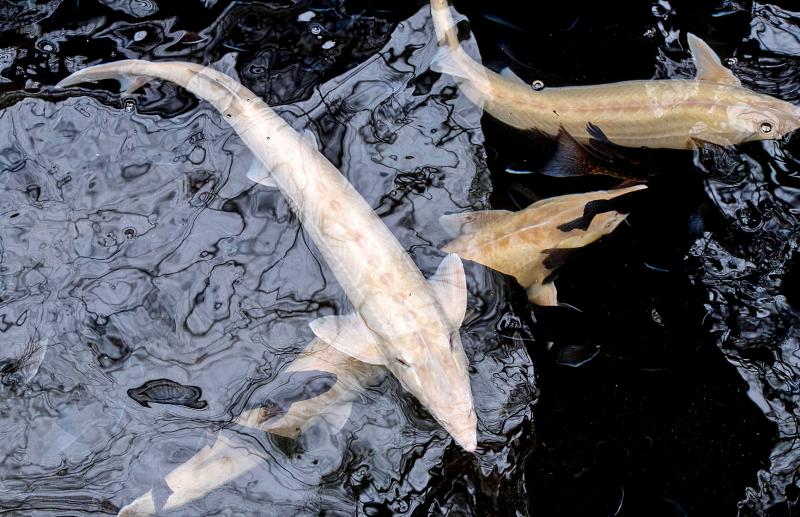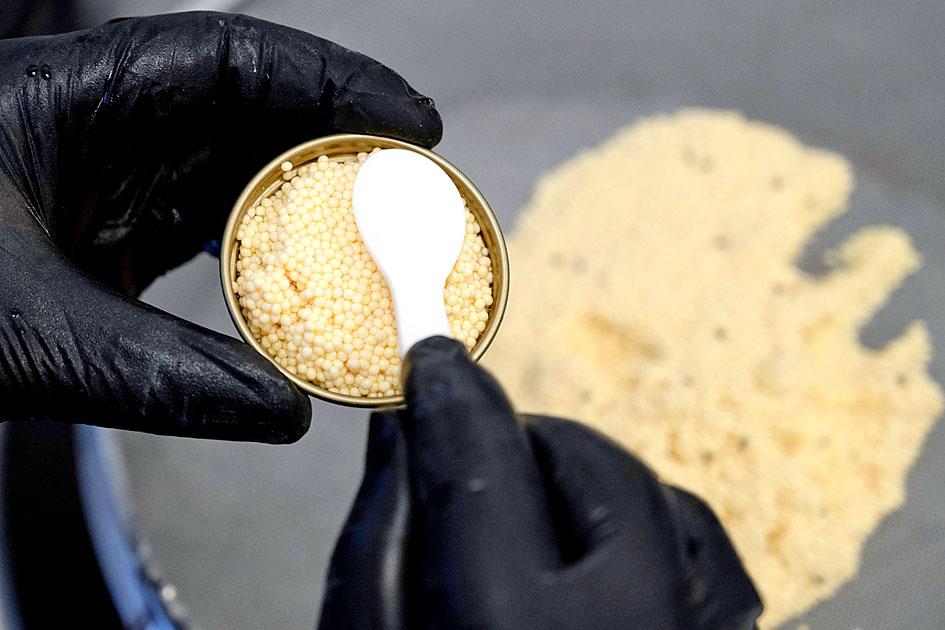In his waders, Stefan Astner checks on the albino sturgeon: Almost two decades after they hatched, they are ready to be gutted for their caviar to be shipped out for New Year’s celebrations.
“The fish have already been through the ultrasound, so we saw that they are full [of roe] and they will go into production soon,” Astner said, dipping his net into a small pond teeming with the rare, white sturgeon.
Deemed the most expensive food in the world, demand for caviar — essentially, salted roe — has driven most sturgeon species to the brink of extinction in the wild.

Photo: AFP
Yet fish farms like the one where Astner works in the village of Groedig, near the Austrian city of Salzburg, offer a more sustainable alternative.
Owner Walter Gruell is one of about 2,500 sturgeon farmers worldwide that produce a combined 415 tonnes of caviar a year, the World Sturgeon Conservation Society’s most recent figures dating from 2018 showed.
However, patience is imperative for producers.

Photo: AFP
The required investment is high and does not pay off for years until the sturgeon begin carrying roe — that is if they are not stolen by gangs hoping to skip the arduous breeding process.
The albino female that Gruell slices with surgical precision is 16 years old. Slowly, he removes, rinses and weighs the cream-colored roe, which, like the fish, lacks pigmentation.
There are no more than 40 sturgeon breeders specializing in albinos worldwide, said Thomas Friedrich, an expert on sturgeon at the University of Natural Resources and Life Sciences in Vienna.
Although there is no research suggesting that lack of pigmentation affects caviar’s taste, Gruell is convinced of its superiority, asserting that “it’s even sweeter, even smoother than the traditionally black one.”
Consumers are willing to pay for the difference.
The female that Gruell just cut yields 600g, worth 8,000 euros (US$9,708) — more than three times the price that black caviar fetches.
The COVID-19 pandemic has curbed demand as upscale restaurants, like all eateries in Austria, have been closed, but retail is booming, partly because people still want to treat themselves, Gruell said.
“People want to savor the present moment,” he said, between the many telephone calls ahead of end-of-year celebrations, when he makes close to 40 percent of his annual turnover.
While reporters visited his farm, Gruell spoke to a luxury automaker, and shortly before had been in contact with an airline hoping to serve first-class travelers caviar “Made in Austria.”
Demand for caviar remains high, and not just from paying customers, but sturgeon rustlers, too.
A year ago, 400kg of sturgeon were stolen from a farm less than two hours away from Groedig.
The eviscerated fish were later found in a reservoir. A year before that, 400 individual sturgeon worth 50,000 euros were stolen from another farm.
At Gruell’s farm, the fish, which include sturgeon native to the Danube, are protected by surveillance cameras and high fences with heavy padlocks.
Although sturgeon breeding in countries like China, France and Italy started as a purely financial venture, it is now also seen as a sustainable alternative to wild sturgeon. Having survived the demise of the dinosaurs, some sturgeon species have recently gone extinct, while others are on the brink.
In Russia and Iran, production of wild caviar collapsed in the 1980s due to overfishing as well as pollution in the Caspian Sea.
Most countries along the Danube now protect the local sturgeon species, although experts worry that conservation might have come too late.
Official government data in Romania, where the Danube empties into the Black Sea, show that catches of Russian sturgeon plummeted from 3,725kg in 2002 to just 37kg in 2005, indicating that overfishing had gravely diminished their numbers.
Although the country issued a moratorium in 2006, impoverished fishermen continue to try to catch the fish, as the roe that one sturgeon can carry are worth as much as a fisherman’s annual income.
Some fans of the delicacy still believe that the taste of wild caviar eclipses that extracted from farmed sturgeon — although Gruell said that his albinos are in a taste category of their own.

Semiconductor shares in China surged yesterday after Reuters reported the US had ordered chipmaking giant Taiwan Semiconductor Manufacturing Co (TSMC, 台積電) to halt shipments of advanced chips to Chinese customers, which investors believe could accelerate Beijing’s self-reliance efforts. TSMC yesterday started to suspend shipments of certain sophisticated chips to some Chinese clients after receiving a letter from the US Department of Commerce imposing export restrictions on those products, Reuters reported on Sunday, citing an unnamed source. The US imposed export restrictions on TSMC’s 7-nanometer or more advanced designs, Reuters reported. Investors figured that would encourage authorities to support China’s industry and bought shares

TECH WAR CONTINUES: The suspension of TSMC AI chips and GPUs would be a heavy blow to China’s chip designers and would affect its competitive edge Taiwan Semiconductor Manufacturing Co (TSMC, 台積電), the world’s biggest contract chipmaker, is reportedly to halt supply of artificial intelligence (AI) chips and graphics processing units (GPUs) made on 7-nanometer or more advanced process technologies from next week in order to comply with US Department of Commerce rules. TSMC has sent e-mails to its Chinese AI customers, informing them about the suspension starting on Monday, Chinese online news outlet Ijiwei.com (愛集微) reported yesterday. The US Department of Commerce has not formally unveiled further semiconductor measures against China yet. “TSMC does not comment on market rumors. TSMC is a law-abiding company and we are

FLEXIBLE: Taiwan can develop its own ground station equipment, and has highly competitive manufacturers and suppliers with diversified production, the MOEA said The Ministry of Economic Affairs (MOEA) yesterday disputed reports that suppliers to US-based Space Exploration Technologies Corp (SpaceX) had been asked to move production out of Taiwan. Reuters had reported on Tuesday last week that Elon Musk-owned SpaceX had asked their manufacturers to produce outside of Taiwan given geopolitical risks and that at least one Taiwanese supplier had been pushed to relocate production to Vietnam. SpaceX’s requests place a renewed focus on the contentious relationship Musk has had with Taiwan, especially after he said last year that Taiwan is an “integral part” of China, sparking sharp criticism from Taiwanese authorities. The ministry said

US President Joe Biden’s administration is racing to complete CHIPS and Science Act agreements with companies such as Intel Corp and Samsung Electronics Co, aiming to shore up one of its signature initiatives before US president-elect Donald Trump enters the White House. The US Department of Commerce has allocated more than 90 percent of the US$39 billion in grants under the act, a landmark law enacted in 2022 designed to rebuild the domestic chip industry. However, the agency has only announced one binding agreement so far. The next two months would prove critical for more than 20 companies still in the process